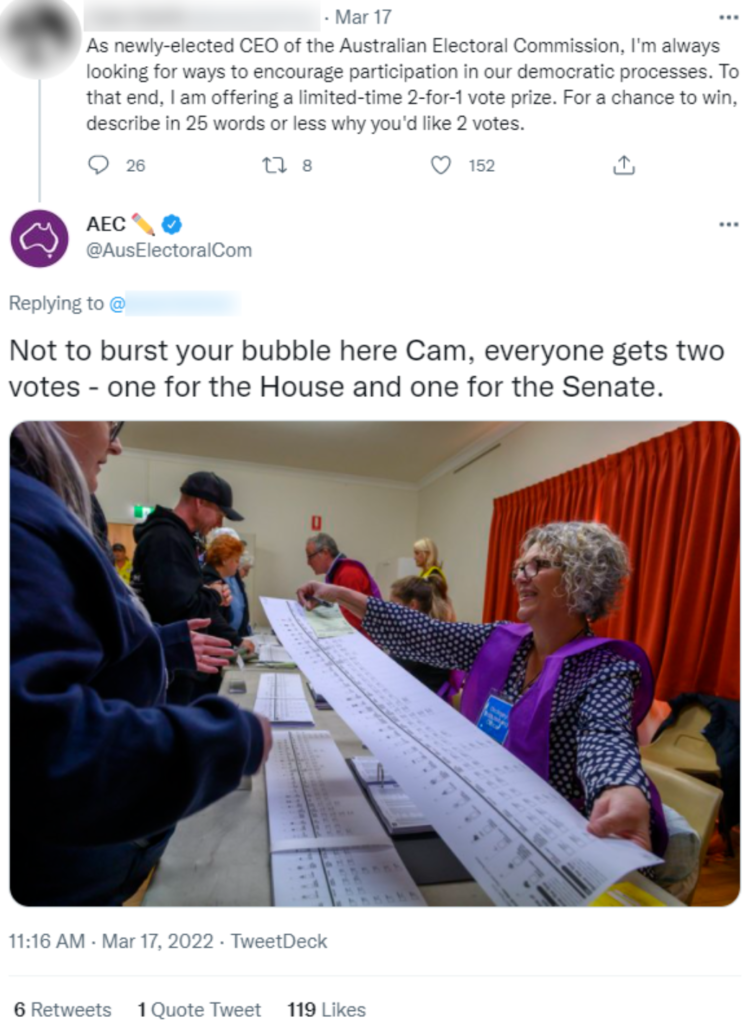What does reputation have to do with the Australian Electoral Commission’s use of social?
In this episode, Propel’s Roger Christie and Spokesperson for the Australian Electoral Commission (AEC) Evan Ekin-Smyth unpack the integral role of social media in the AEC’s Reputation Management Strategy to help you confidently build your digital reputation.
Together they explore:
- how purpose and strategy can keep you safe and successful on social media;
- digital participation as a powerful risk mitigation strategy;
- why building an online presence can help your social media program; and
- the importance of leadership buy-in for an effective digital presence.

The insights + advice.
Roger Christie: Can you share a bit about the Australian Electoral Commission’s social media journey?
Evan Ekin-Smyth: It certainly didn’t start where it is now. The AEC has been on social media channels since 2012. At that point, we were really feeling our way. And we’re still feeling our way because everything changes every single day on these channels.
But we’re very deliberate in what we do for this federal election. Our Reputation Management Strategy is new and it helps inform our social media approach. And it’s really in response to the environment that we’re facing.
We’re funny when we want to be. We’re firm when we want to be. We’re aloof when we want to be. We treat each interaction on its merits and we have a team and a structure that sits behind it to make sure that we can be active and that we can put our best foot forward.
Roger Christie: Essentially what we’re saying is avoidance is really the risk. Participation presents you with an opportunity – skin in the game, if you will – to counter any disinformation. Can you talk a little bit about how you came to that mindset?
Evan Ekin-Smyth: I think a big part is our reflection on the fact that we are truly an independent statutory authority. Our approach, both online and in our broader communication, is really led by the Australian electoral commissioner. He’s got his hands deep in this approach.
Often I think public service agencies, sometimes rightly, sometimes wrongly, think the least risky approach is to do nothing. And sometimes it’s the best approach. When you’re talking about communication sometimes you need to hold on and see where things lay before you put your own vocals into it, but there’s significant risk in that.
We’re clearly being very active. We think that the AEC being an active voice in the conversation is only a good thing. We are electoral experts. We run the process. So wherever we can inform Australians about how it operates, that’s what we’re doing.
That’s our strategy – to be active, to be judicial in our use of tone and timing and language.
And we think we’re putting a positive face on the body who runs Australia.
Roger Christie: How has building your online presence helped or hindered your social media program?
Evan Ekin-Smyth: It’s helped enormously. It is part of the strategy. I mean, we’ve got written on our wall, in the office hearts and minds because it’s about winning hearts and minds. Making the general population just how valuable Australian elections are and how lucky we are that they run that the way they are. So winning hearts and minds is important.
Roger Christie: How important has endorsement from your leaders been as you’ve executed this strategy online?
Evan Ekin-Smyth: So this is not an approach that I’ve just sat there and said, ‘This is what we need to do, and I don’t care what you think I’m going to press ahead’. This is an approach that’s fully got the endorsement of our executive leadership team and particularly our Commissioner.
I worked with him closely on a daily basis with very regular interaction around a range of operational issues and pieces of communication to make sure that he has a level of comfort. But at the same time, with an approach like this, he can’t be across it all. And our executive leadership team can’t be across it all. That’s why we have a Reputation Management Strategy in place.
So it’s a really strategic endorsement of what we’re doing in response to the environment. And we have the endorsement of the Electoral Commission and the broader election executive leadership team, and a really close connection. Without any one of those things, it couldn’t work.
Digital leadership in practice.
As Evan said, the AEC is “a little bit different when it comes to public service communication”. Their use of humour has been an effective form of defence against disinformation and a powerful way to foster trust, connection and rapport with online communities.
More on this example here: Using humour on social media to combat electoral misinformation.
NSW Police Force also uses humour successfully to engage the public without sacrificing their integrity or message. Their Facebook page seamlessly blends serious appeals for public information, important updates, humorous memes and puppy pictures to humanise the police force.
While humour won’t work for every organisation, these examples show the importance of knowing your message, understanding your audience and reacting appropriately to the online environment you’re dealing with.
Final takeaways.
Evan Ekin-Smyth: Looking at risk is an important thing. Look carefully at it and plot out different approaches – from a very active and human voice to a very inactive and bureaucratic voice. Think about where the risks lie on all those different approaches. And look at your structures according to what those approaches are. Because for some, a very active approach will represent a whole range of risks that an inactive approach might not. What are the dangers of all those?
Put yourself in the audience member’s shoes. Not everybody who is engaging with your channel is going to like what you’re doing. And we’re not simply here to please every single individual user, but there is a way to engage with risk and use a voice and an understanding of your audience to communicate in a more meaningful way.
To listen to this conversation in full, head to Apple Podcasts, Spotify or wherever you get your podcasts.
Once there, please subscribe, leave a review or drop us a note with any thoughts from this conversation – when it comes to public sector social media – in particular leaders – we’d love to hear from you.

